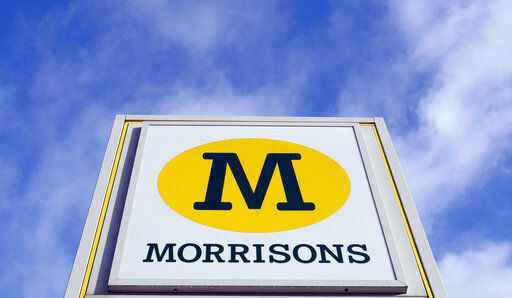LONDON — Shares in British supermarket chain Morrisons spiked by 11% on today as investors priced in the possibility of a bidding war for the company after a third U.S.-based investment company said it was mulling a bid.
Private equity firm Apollo Global Management said it is “in the preliminary stages of evaluating a possible offer for Morrisons” and that no formal approach has yet been made.
“There can be no certainty that any offer will be made, nor as to the terms on which any such offer might be made,” Apollo said in a statement.
The statement comes after Britain’s fourth-largest retailer said it had agreed a 6.3 billion-pound ($8.7 billion) takeover from a group of investors led by Fortress Investment. When debt is added in, that bid is worth 9.5 billion pounds.
Morrisons’ share price was up more than 11% to around 266 pence on Monday morning on the London Stock Exchange following Apollo’s statement.
The company, which employs about 110,000 people, operates 497 stores and 339 gas stations across the U.K.
The current share price is higher than the valuation from the agreed offer from Fortress and its partners, the Canada Pension Plan Investment Board and Koch Real Estate Investments. That will see shareholders receive 252 pence per share plus a 2 pence special dividend.
The Morrisons board said they believe the offer will “support and accelerate” plans to further grow the business. Fortress, which is owned by Japan’s Softbank, has previously invested in grocery retail in both North America and Europe.
The agreement came almost two weeks after private equity firm Clayton, Dubilier & Rice made a 5.5 billion-pound approach, which the Morrisons board rejected because it said it undervalued the company. The firm has until July 17 to table a formal bid to buy Morrisons, due to U.K. takeover rules.
Neil Wilson, chief markets analyst at Markets.com, said there could be another couple of offers up to a potential “knockout” around the 280 pence a share mark.
“We’ve talked fairly regularly about the amount of private equity money there is waiting for U.K. companies, which are cheap versus peers,” he said.
Private equity firms typically acquire undervalued companies and then look for ways to cut costs and boost profits before selling them at a profit. British assets are widely considered to be cheaper than they otherwise would have been as a result of Britain’s departure from the European Union and the coronavirus pandemic.
Morrisons appears an attractive opportunity for private equity as its value had been below its pre-pandemic levels despite strong recent revenues.
Morrisons was founded in 1899 as an egg and butter stall in a market in the north England city of Bradford. It steadily expanded and became a publicly-listed business in 1967. It expanded further in 2004 with the acquisition of rival Safeway, a move that grew its presence in the south of England.
The firm is now largely owned by a raft of institutional shareholders, including Silchester International, Columbia, Blackrock and Schroders.


